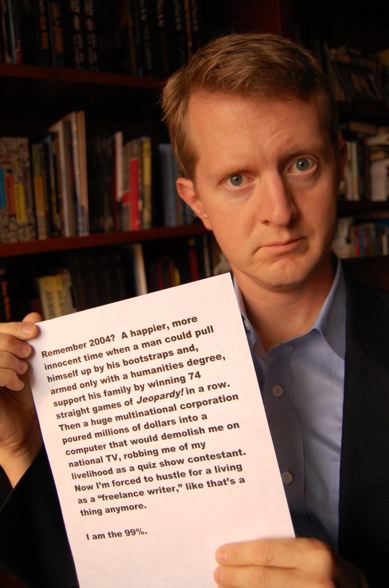With the Occupy Wall Street demonstrations spreading from New York to other U.S. cities this week, business leaders beyond the stock exchanges are wondering what exactly is going on: Is this truly the American version of the Arab spring? What do the demonstrators want? What outcome can be expected? Should businesses respond to the Wall Street protests, and if so, how?
While some of the organizers see their movement as being connected to the uprisings in the Middle East, Occupy Wall Street is less an explosion of rage against an authoritarian and oppressive government than an expression of frustration that a democratic economic system isn't living up to its potential.
In that respect, Occupy Wall Street has a lot more in common with India's anti-corruption movement than with the Arab spring. A glance at what's happening in India shows both the potential power of Occupy Wall Street and its potential weaknesses. Such a comparison also reveals the need for businesses to address the issues raised by the Wall Street protesters before it's too late.
The anti-corruption sentiment had been smoldering for decades until it burst into flame with the jailing last August of Anna Hazare, widely regarded as a trustworthy, honest, and humble social activist. Despite longstanding complaints about bribery and cronyism, the vehemence of the subsequent demonstrations took government officials and others by surprise. In some respects, there are parallels with Occupy Wall Street: The U.S. movement draws its greatest media attention when protesters are arrested, and despite longstanding complaints about the financial industry's role in the recession and worldwide downturn, industry leaders were blindsided by the tenacity of the demonstrators in lower Manhattan.
But what has made the anti-corruption movement in India so effective is its organization including a clear division of labor and its focus. While Hazare was fasting in protest and grabbing headlines, other members of the movement's highly professional and experienced team answered media questions, coordinated demonstrations, methodically galvanized the support that spontaneously erupted across India, and drew attention to a specific piece of anti-corruption legislation known as the Lokpal bill.
In order to maintain focus and singularity of purpose, organizers barred politicians from speaking at the main protest site or joining the demonstrators. Several businesses in India realized that it was in their interest to support the anti-corruption movement and readily supported it.
Occupy Wall Street remains essentially leaderless a point of pride for many demonstrators and it's open to everyone, from students to unions to politicians. Perhaps as a consequence, the movement's message has remained diffuse. It's unclear whether the protesters would be able to leverage their support to further a specific goal. If the movement doesn't consolidate quickly, it risks becoming anarchistic, a term already used by some police in describing the demonstrations.
So if Occupy Wall Street is leaderless and unfocused, why isn't it going away? The persistence of the "occupations" is a signal that there is authentic, deep-seated unhappiness with the failings of the U.S. economic system. It's an indicator that economic inequality is perceived as an important issue one requiring business's immediate attention.
The demonstrators are asserting that they are stakeholders in American business, and they're correct they are stakeholders, as consumers, as employees, and as citizens affected by the financial system in general. Businesses would do well to accept that fact and engage with the protesters, rather than trying to demonize or dismiss them. Failure to engage now might eventually weaken business's position later: The Indian government tried to dismiss the anti-corruption movement, but public opinion was strongly in favor of it. Consequently, the government later found it difficult to negotiate the details of the legislation, because any proposed modifications were seen by the public as support for corruption.
Here are a couple of things corporate America can do: First, businesses need to address the protesters' key points that a very low percentage of Americans possess a disproportionately large slice of wealth and that there's a high ratio of average CEO pay to average employee pay in the U.S., compared with other countries. This assertion that economic inequality is persistent and rising is on target, as both academics and unions have shown.
Businesses should look at whether existing models of compensation are contributing to this inequality. They need to find ways to reward performance without increasing pay disparities. Developing new models of compensation and governance is not easy and can only be possible through a long-term and sincere engagement with a wide set of stakeholders, such as regulators, academics, and representatives of workers.
Second, businesses should find ways of empathizing with protesters' frustrations on points of genuine concern. This empathy could be expressed by individual business leaders (as Laurence Fink of BlackRock did) or by the business as a whole (as Ben & Jerry's did). Companies like Google that have a history of contributing to social causes or billionaires with established records of giving such as Bill Gates and Warren Buffett are best positioned to lead the engagement from the side of business. That should not, however, be a reason for other business leaders and businesses to remain on the sidelines of the conversation started by the protesters. Any open and sincere engagement by businesses will show that the commercial world is not content being seen as part of the problem and is keen to be part of the solution. Even if businesses entirely disagree with the demonstrators' viewpoints, they need to approach the protesters as equals in public discourse. Business leaders' views will be better received if they are presented with humility.
Regardless of whether the protest movement sputters out or continues to acquire strength, the underlying economic inequality issues it points to are not likely to go away anytime soon. Businesses should therefore approach the events that are occurring in the streets outside their offices as a learning opportunity, with an eye on managing the growth of long-term anti-business sentiment in public discourse.

